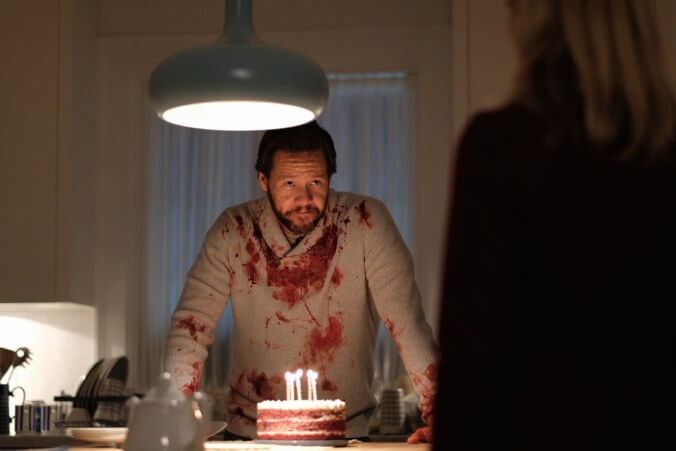Does this aggression have anything to do with the strange red meteorite that they found outside in a puddle of water, earlier that night? Or is this just the way any woman’s date with any dude can go, on any given night?
The one good idea involves Annie’s hesitancy to suggest that maybe—just maybe—those crazy red rocks are turning all the town’s men into raging assholes. She holds back her theory in part because she knows how batty ir sounds. (Although it actually seems pretty obvious, especially after the fellas start goading each other into chugging irradiated red water, chanting, “Shoot! The! Stone!”) But perhaps she’s also wary because been conditioned to give boys the benefit of the doubt.
Throughout Martha’s party, the guests—which include Annie’s new boss, who’s a friend of the family—ask Annie about her “date” with her coworker Dylan (Luke Kirby), noting that he’s a good guy to have in her corner. (“Stick with him and you’ll move up fast!” she keeps hearing.) She doesn’t quite know how to describe what happened with Dylan that’ll properly get across how scary he became when she rejected him. Even after the plague spreads in a way that’s impossible to ignore, Annie still seems to blame herself for what went wrong with the night before, telling Martha that she’s probably to blame for sending Dylan mixed signals.
The main problem with this episode though is that the more ambiguous parts of “Not All Men”—the ones that resemble the more common everyday examples of sexual harassment and micro-aggressions—are pretty much steamrolled once the story switches to all-out horror. Martha’s otherwise genteel husband Mike (Ike Barinholtz), for example, is too obviously transformed by the rocks. Yes, when he finally goes berserk, some of the things he raves about (such as Martha interrupting him while he’s trying to tell a funny story) are carried over from earlier in the evening, when he was much nicer. But his anger at the end is so ferocious and so all-consuming that there’s no way to mistake it for anything but the work of some external force, beyond mere testosterone.
That said, this episode’s credited writer Heather Anne Campbell (who also co-wrote last week’s “Six Degrees Of Freedom”) does try to restore a sense of “this is all too real” with her twist ending. One subplot involves two gay teens, Cole and Steve, who sneak off with a couple of sixers to a secluded boat. In an echo of the opening scene, Cole decides he doesn’t want to go any further with Steve, not long after they start making out. While Steve throws the same kind of fit Dylan did, Cole keeps his cool. Later, he tells Annie and Martha that he was exposed to the meteorites too, but stayed under control because, “I just chose to.” Not all men, indeed.
There are other interesting wrinkles in “Not All Men,” nearly all of which could’ve run much deeper. There’s a scene late in the episode when Martha tries to ingest some of the meteorite fumes, hoping that becoming more like the men will help the women fight back. It’s a callback of sorts to a shot earlier of Annie doing yoga, practicing the “warrior” pose. Some of the slyer moments in this Twilight Zone cofront the idea that society is too oriented around male needs and interests, and that women have internalized the notion that the only way to be successful is just to go along with this. Annie’s “arc”—as curtailed as it is—is about her finally calling out shitty behavior, rather than second-guessing what she experiences firsthand. (In a final bit of triumph, she snarls at a soldier who tells her she’d look cuter if she smiled more.)
Unfortunately, there’s just not as much here as there should be: about the finer gradations of gender identity, say, or about the normalization of caveman bullshit in the our culture (even without poisonous star-rocks).
What does work throughout is Christina Choe’s direction. Like Choe’s unnerving 2018 indie drama Nancy, “Not All Men” imbues placid, middle-class America with a subtle, almost ineffable menace. When Annie’s town descends into mayhem, the persistent explosive action in the background makes even casual conversations more tense. Plus, this episode’s a relatively tight 40 minutes, helping maintain its nightmarish momentum.
Choe elicits outstanding performances from a very good cast, graced with accomplished small-screen vets Seehorn, Barinholtz and Kirby. The less-experienced Farmiga (Vera’s much-younger sister, whose most prominent TV work has been in multiple American Horror Storys) more than holds her own here, particularly in that disturbing opening scene opposite Kirby. As Dylan busts out all of his seduction power-moves—from playing Lionel Richie’s “Hello” on the turntable to rather pathetically promising “I’ll do you first” after Annie turns down sex—the two actors create a painful, all-too-real tableau of dread. Really, the rest of the episode is almost unnecessary.
Stray observations
- It’s probably just my imagination, but Jordan Peele’s host intro this week seems much flatter and more sedate than usual, almost as though Peele were less-than-persuaded by the Twilight Zone-iness of this particular Twilight Zone. His description of what’s about to happen mostly focuses on Annie, describing her as a person who grew up believing she could “maintain control” if she just played “by the rules.” The implication is that both in the workplace and in their personal lives, smart and capable young women frequently find themselves slipping into the Twilight Zone, where everything they’ve been taught about professional behavior and gentlemanliness gets flipped on its head in an instant. That’s a powerful allegorical use of this series’ central concept—and pretty persuasive, too. But it’s also so blunt that it dissipates the eerie air of mystery that permeates this show’s finest episodes.
- At its best, this episode reminded me of the recent Brian Taylor horror-comedy Mom And Dad, in which Nicolas Cage and Selma Blair play parents infected with a fast-spreading virus that drives people to murder their offspring. That movie also implies that no mere infectious agent can make human beings do anything that they’re not already—deep down—kind of inclined to.









































